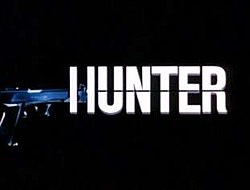Hunter (1984 U.S. TV series)
| Hunter | |
|---|---|

Title card for first three seasons of the show.
|
|
| Genre | Crime / Action |
| Created by | Frank Lupo |
| Starring |
Fred Dryer Stepfanie Kramer Charles Hallahan John Amos Bruce Davison Darlanne Fluegel Lauren Lane Arthur Rosenburg John Shearin Garrett Morris James Whitmore, Jr. Ruby Ramos Perry Cook Richard Beauchamp Courtney Barilla Eve McVeagh |
| Composer(s) |
Mike Post (1984–90) Pete Carpenter (1984–90) Walter Murphy (1990–91) Christopher Franke (2003) |
| Country of origin | United States |
| No. of seasons | 7 |
| No. of episodes | 153 (list of episodes) |
| Production | |
| Executive producer(s) |
Stephen J. Cannell (1984–85, 2003) Roy Huggins (1985–88) George Geiger (1988–89) Fred Dryer (1989–91, 2003) Frank Lupo (2003) Stu Segall (2003) |
| Running time | 48 minutes (without commercials) |
| Production company(s) | Stephen J. Cannell Productions (entire run) Stu Segall Productions (2003) 20th Century Fox Television(2003) NBC Studios (2003) |
| Distributor | TeleVentures (1988-90) Columbia Pictures Television (1990-1994) Columbia TriStar Television (1994-2002) Sony Pictures Television (2002-) NBCUniversal Television Distribution (2003, Domestic) MGM Worldwide Television Distribution (2003, internationally) |
| Release | |
| Original network | NBC |
| Original release | September 18, 1984 – April 26, 1991 |
Hunter is an American crime drama created by Frank Lupo, which ran on NBC from 1984 to 1991. It starred Fred Dryer as Sgt. Rick Hunter and Stepfanie Kramer as Sgt. Dee Dee McCall. The title character Sgt. Rick Hunter was a wily, physically imposing, often rule-breaking homicide detective with the Los Angeles Police Department. The show's main characters, Hunter and McCall, resolved many of their cases by lethal force, but no more so than many other related television dramas.
The show's executive producer during the first season was Stephen J. Cannell, whose company produced the series. Stepfanie Kramer left after the sixth season (1990) to pursue other acting and musical opportunities. In the seventh season, Hunter partnered with two different women officers.
The show was initially broadcast in a time slot on Friday night, competing for ratings against the popular Dallas. The show struggled to attract an audience and drew criticism for its often graphic depiction of violence. In the first season, the producers sought to create a hook by giving the main character a catchphrase, "Works for me", which was sometimes used two or three times in an episode and was even added to the end of Mike Post and Pete Carpenter's opening theme music. Several early episodes featured montages set to popular songs from the 1960s, 1970s, and 1980s, in a style similar to Miami Vice.
Midway through the first season, with low ratings still, Cannell gave network chief Brandon Tartikoff a private screening of a two-part episode ("The Snow Queen") that had not yet aired, and asked him to give the show more time to attract viewers. Tartikoff agreed and put the show on hiatus until a better time slot could be found. Two months later, Hunter resumed, this time on Saturday nights, and viewership slowly started to rise. The first season finished in 65th place.
For its second season, Cannell brought in his mentor, Roy Huggins, best known for his work on Maverick and The Rockford Files, to refine the show. As the new executive producer, Huggins toned down the violence, softened the main character's fractious relationship with his superiors, dropped a backstory concerning Hunter's family ties to the mob, and emphasized the chemistry between Hunter and McCall. Huggins also moved the show's setting out of the back streets and into the more desirable areas of Los Angeles. Emboldened, Dryer and Kramer frequently improvised the scripts, and the Hunter character broke the fourth wall for the first time with an aside to viewers at the end of the episode "The Beautiful and the Dead".
...
Wikipedia
